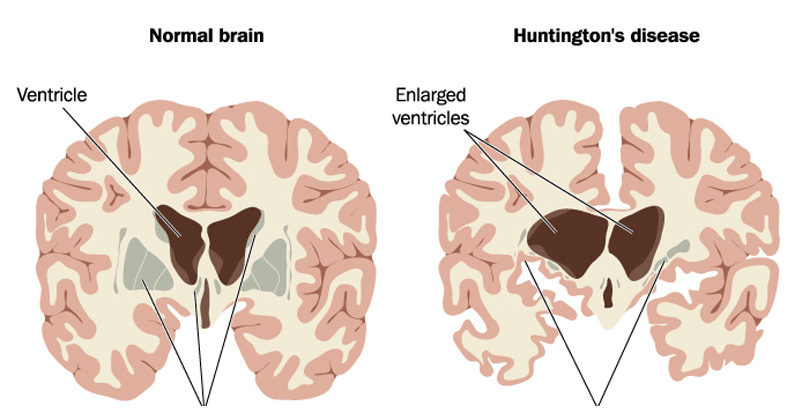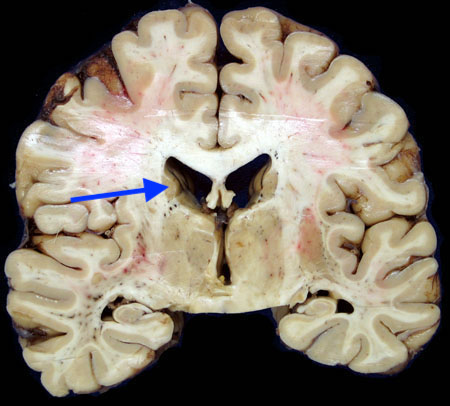Page Contents
OVERVIEW
This page is dedicated to organizing various examples of standardized exam questions whose answer is Huntington disease (HD). While this may seem a odd practice, it is useful to see multiple examples of how Huntington disease will be characterized on standardized exams (namely the boards and the shelf exams). This page is not meant to be used as a tradition question bank (as all of the answers will be the same), however seeing the classic “test” characterization for a disease is quite valuable.

KEY CHARACTERISTICS OF THIS CONDITION (ON EXAMS)
When it comes to standardized exams, each topic has its own “code” marked by key buzzwords, lab findings, clues, etc. If you are well versed in this code you will be able to more quickly identify the condition that is being discussed, and get the right answer on the exam you are taking. Below is the “code” for Huntington disease.
Chief Complaints:
- Behavioral changes/deterioration: this can take many different forms (irritable, sexually uninhibited, loud aggressive)
- Worsening memory: sometimes can be the presentation (with or without personality changes)
- Jerking movements will be observed by the physician and others (and be described as involuntary movements by the patient)
Patient History:
- Middle aged patient population most common although can be seen in younger patients at times
- Family history of a similar illness (parent dying at a younger age) or a mysterious family history (patient does not know parents/why they died/etc).
Clinical Workup;
- Facial grimacing/twitching is a very common finding
- Jerking movements can be observed by the physician and others
- No strength, sensory, or deep tendon deficits: these components of the neurological exam are generally normal in patients.
- Memory issues are often detected on the mental status exam (worsening recall)
- Atrophy of caudate nuclei can be seen on imaging studies or on gross pathology
QUESTION EXAMPLES
Question # 1
A 55 year old woman is brought to the clinic by her husband because she has been having changes in her personality over the past 5 years. He husband explains that she used to be easygoing and soft spoken, but has become very different over the past few years. He comments that she is more irritable, sexually uninhibited, and loud. She recently embarrassed him in public which is why he scheduled this appointment. She also has been having intermittent jerky movements during this period of time. Her father had similar symptoms when he was 57 years old. She does not take any medications and does not drink alcohol or smoke cigarettes. She is unkempt and restless during the visit. She makes dirty jokes to the physician during the examination. Physical exam shows irregular, rapid, and jerky movements of the tongue and the lower extremities. The wrist extends in quick jerks as well. A complete blood count, serum concentrations of vitamin B12, folic acid, and TSH are all within normal limits. Serological testing for syphilis is negative. What condition does this patient most likely have?
Explanation # 1
Personality changes + jerking movements + family history (of similar symptoms) = Huntington disease
Question # 2
A 38 year old man is brought to the clinic because of a changes with his personality that has been occurring for the past 5 months. He has become sexually more promiscuous, tactless, impulsive, and very easily agitated. Notably, his father had similar symptoms when he was 42 years old. Physical exam reveals involuntary movements of the tongue. He has sudden coarse jerking movements the arms that appear involuntary, although he tries to hide these movements by pretending he is straightening his hair. What is the likely diagnosis in this patient?
Explanation # 2
Personality changes + jerking movements + family history (of similar symptoms) = Huntington disease
Question # 3
A 50 year old woman comes to the clinic by her partner because she has “completely changed her personality“. This all began about 5 months ago when her husband noticed she became irritable and started believe that her neighbor was trying to sabotage her career. She is also very forgetful, and has made some serious financial errors when filing her tax return. Her husband also comments that she has unusual jerking movements in her arms and twitching in her face. The patient’s father had dementia in his late 50s, but the details of his condition/death are a mystery. A physical exam is notable for facial grimacing, difficulty maintaining tongue protrusion, and issues with smooth pursuits. The cranial nerves are otherwise unremarkable. There are intermittent rapid asymmetric jerking movements of all the extremities that interrupt the exam. Muscle strength and sensation is intact. The patient scores a 19/30 on a mini-mental status exam. A CT scan shows bilateral atrophy of the caudate nuclei. What is the likely diagnosis in this patient?
Explanation # 3
Personality changes + facial grimacing + jerking movements + family history (mysterious but suggestive) + atrophy of caudate nuclei= Huntington disease
Question # 4
A 25 year old male has involuntary moments that have been worsening over time. He undergoes a new radioisotope imaging study to try and localize any abnormalities in his brain. The study reveals abnormal metabolic activity in the region of the brain shown below.

What is the likely diagnosis in this patient?
Explanation # 4
Involuntary/jerking movements + affected caudate nuclei= Huntington disease
Question # 5
A30 year old male comes to the clinic to be evaluated for abnormal movements involving his extremities and his face. The patient explains that he began grimacing involuntarily about 14 months ago, and that this has worsened recently. He is currently being treated for depression, but has no other medical conditions. His father was diagnosed with a genetic movement disorder recently as well. A physical exam demonstrates normal strength and deep tendon reflexes. There are no sensory deficits. What is the likely diagnosis in this patient?
Explanation # 5
Involuntary/jerking movements + family history = Huntington disease
Question # 6
A 50 year old male is brought to the physical by his son. He explains that his father has been acting “unlike himself” for the past year. He seems to disregard the feelings of his family, and can be overly aggressive sometimes. The son describes that his father also has periodic jerky movements that involve his arms. What is the likely diagnosis in this patient?
Explanation # 6
Personality changes + involuntary/jerking movements = Huntington disease
Question # 7
A 38 year old male begins to become more and more depressed, impulsive, and agitated over the past 8 months. He has periodic facial grimacing, and also has involuntarily jerking movements that involve his fingers and hands. What is a possible diagnosis in this patient?
Explanation # 7
Personality changes + facial grimacing + involuntary/jerking movements = Huntington disease
Question # 8
A 60 year old male come to the clinic because he has been having issues with his memory. He explains that recently he was “let go” from work because he is not able to remember all of his responsibilities and daily tasks. He also explains that for the last few years he has been experiencing episodes of facial grimacing, and also has involuntary leg spasms. The patient’s father was killed in his mid 20s due to a tragic accident, however the patients family history is otherwise unremarkable. A neurological exam reveals that he has frequent involuntary jerking movements that involve his extremities asymmetrically. A mental status exam shows that the patient can recall 0 out of 5 objects after 5 minutes. What is a likely diagnosis in this patient?
Explanation # 8
Memory changes + facial grimacing + involuntary/jerking movements = Huntington disease
Question # 9
A 45 year old male is brought to the office by his wife because he has been having personality and behavior changes recently. She explains that her husband believes that extra-terrestrial life has been contacting him and has been trying to steal their beloved family dog. She explains that these changes began slowly a few years ago. The patient is adopted and his family history is unknown. A physical exam shows uncontrolled movements of the tongue, and bilaterally jerking movements of the upper extremities. A mental status exam is notable for decreased recall/impaired memory. What is the likely diagnosis in this patient?
Explanation # 9
Personality changes + involuntary/jerking movements + impaired recall/memory = Huntington disease
TESTABLE FACTS ABOUT THIS TOPIC (BEYOND ITS IDENTIFICATION)
Many questions on standardized exams go beyond simply recognizing the underlying topic. Often there are specific testable facts regarding some aspect of the topic’s pathophysiology/management/clinical implications that are commonly asked. Some of these are listed below:
Cause:
- Cause: inheritance of trinucleotide repeats (CAG/glutamine) on the Huntington (HTT) gene (chromosome 4).
- Inheritance pattern: autosomal dominant.
- Area of brain affected: caudate nuclei
- Neurotransmitter that is deficient: GABA. Loss of this inhibitory neurotransmitter is seen in patients with this condition.
Other:
- Inheritance can demonstrate phenomenon of anticipation: as increased numbers of trinucleotide repeats amass on the HTT gene, patients of each subsequent generation may develop symptoms sooner as sooner
Page Updated: 03.28.2018